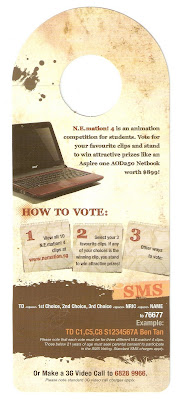
I was wondering, what's a "Free Seating" sign doing here in a food centre? Isn't it universally understood that we can sit at any table that we want at a food centre, without having to be assigned to a table? And so I snapped a picture of it. Haha.
I looked up "free" as an adjective in the Longman Web Dictionary. And wow, there are 19 definitions for "free"! Haha.
free
1. something that is free does not cost you any money
2. not held, tied up, or kept somewhere as a prisoner
3. allowed to do or say whatever you want, or allowed to happen, without being controlled or restricted by anyone or anything
4. if you are free, or have some free time, you have no work, and nothing else that you must do
5. something that is free is available to use because it is not already being used
6. not suffering from something
7. not containing something
8. if something is free of tax, you do not have to pay tax on it
9. used to tell someone that they can do something (feel free)
10. relaxed, friendly, and without many rules (free and easy)
11. someone who lives as they want to rather than in the way that society considers normal (free spirit)
12. to let someone do whatever they want or need to do in a particular situation (give somebody a free hand/rein)
13. used to say that you should not expect to get something good without having to pay for it or make any effort (there's no free lunch)
14. used, usually humorously, to say that you are or should be allowed to do something, after someone has said that you should not do it (it's a free country, British English)
15. to get something without paying for it or working for it, because other people are paying or working for it (get/take a free ride, informal)
16. to be very generous with something (be free with something)
17. to use something that belongs to someone else when you should not (make free with something)
18. something that is free is not held, blocked, or restricted
19. a free chemical substance is not combined with any other substance (technical)
Out of all the 19 definitions, I guess only meanings No. 1 and No. 3 are relevant in this context. Yes, we can also take the sign to mean that we do not have to pay to sit at a table at the food centre. But isn't this "universal knowledge" too? Haha. And yes, the sign can also mean that we have the choice to sit at any table that we want at the food centre. =)

.jpg)
.jpg)

